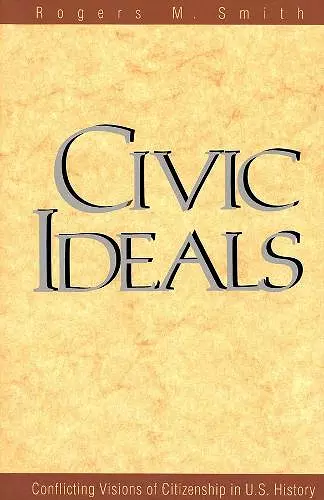Civic Ideals
Conflicting Visions of Citizenship in U.S. History
Format:Paperback
Publisher:Yale University Press
Published:10th Apr '99
Currently unavailable, and unfortunately no date known when it will be back

This title won the American Political Science Association's 1998 Ralph Bunche Award. It was co-winner of the American Political Science Association's J. David Greenstone Book Prize for the best book in history and politics published during 1996-1997, and was a finalist for the 1998 Pulitzer Prize in History.
This work traces political struggles over U.S. citizenship laws from the colonial period through to the Progressive era. It shows how and why throughout this time most adults were denied access to full citizenship, including political rights, solely because of their race, ethnicity or gender.
Is civic identity in the United States really defined by liberal, democratic political principles? Or is U.S. citizenship the product of multiple traditions—not only liberalism and republicanism but also white supremacy, Anglo-Saxon supremacy, Protestant supremacy, and male supremacy? In this powerful and disturbing book, Rogers Smith traces political struggles over U.S. citizenship laws from the colonial period through the Progressive era and shows that throughout this time, most adults were legally denied access to full citizenship, including political rights, solely because of their race, ethnicity, or gender. Basic conflicts over these denials have driven political development and civic membership in the U.S., Smith argues. These conflicts are what truly define U.S. civic identity up to this day.
Others have claimed that nativist, racist, and sexist traditions have been marginal or that they are purely products of capitalist institutions. In contrast, Smith’s pathbreaking account explains why these traditions have been central to American political and economic life. He shows that in the politics of nation building, principles of democracy and liberty have often failed to foster a sense of shared "peoplehood" and have instead led many Americans to claim that they are a "chosen people," a "master race" or superior culture, with distinctive gender roles. Smith concludes that today the United States is in a period of reaction against the egalitarian civic reforms of the last generation, with nativist, racist, and sexist beliefs regaining influence. He suggests ways that proponents of liberal democracy should alter their view of U.S. citizenship in order to combat these developments more effectively.
- Short-listed for Boston Book Review (Nonfiction) 1998
ISBN: 9780300078770
Dimensions: unknown
Weight: 1043g
736 pages